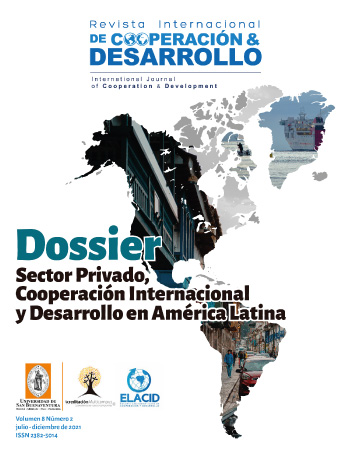INTERNATIONAL JOURNAL OF COOPERATION AND DEVELOPMENT
Assignment of Rights
Authorization for reproduction, publication, communication and distribution of a literary, artistic or scientific
Work.
I , ____________________________________________, author of the book and / or article , of legal age , resident of the city of _________________ , identified with citizenship / passport n° ______________________ issued on _______________________, in exercise of his physical and mental faculties , part henceforth be called the AUTHOR , supports the following authorization to the reproduction, publication, communication and distribution of a work, perform the following terms:
1. Regardless of current legal regulations due to the linking of the parties to this contract, and any kind of legal presumption , the parties agree that the AUTHOR authorize ( name of the publisher ) to reproduce , publish , communicate and distribute the material referred to in the International Journal of Cooperation and Development of the University of San Buenaventura.
2. Such authorization lies in particular on the copyright of the work, by any means known or unknown, publication of the work, distribution of the work , either directly or through third parties for purely educational purposes.
3. AUTHOR agrees to report and declare the existence of this authorization and to preserve the right of the International Journal of Cooperation and Development of the first publication of the work.
4. AUTHOR declares that the article is original and that it is his sole creation, no impediment of any kind exist for the authorization he is doing, besides being responsible for any action claim, plagiarism or other type of claim that might arise about .
5. Such permission is free of charge.
6. Moral copyright in the article are solely the AUTHOR and the University of San Buenaventura expressly agrees to recognize and respect them rigorously.
The Author and / or AUTHORS
SIGNATURE
Abstract
Corporate social management has become the path of the relationship between the community and the company, through these reciprocal positive results can be achieved, based on the realities of the communities evaluated from the lifting of baselines, characterizations, among others, which allow a recognition of the environment where the different projects that respond to the investment lines of the companies are carried out. Starting from the premise that communities participate in these projects to improve territorial conditions, it is possible to create an ecosystem that focuses on mutualism and avoids commensalism, socially speaking. From the implementation of a Probit model, it was possible to statistically show the correlation between the perception of social management compared to the projects that companies execute, which generate greater impact and are acceptable according to their socio-economic and cultural environments.
Keywords: Social Management; Sustainable Development; Development Projects; Community; Afro-descendant.
References
Sánchez, I., Morán, J. & Pérez, J. (2020). Revisión de las principales investigaciones sobre responsabilidad social corporativa y reputación. Revista de Estudios Empresariales. Segunda época. 1, 155-181. https://revistaselectronicas.ujaen.es/index.php/REE/article/view/5401/5065
Server Izquierdo, R. J., & Villalonga Grañana, I. (2005). La Responsabilidad Social Corporativa (RSC) y su gestión integrada. CIRIEC-España, Revista de Economía Pública, Social y Cooperativa, (53),137-161. https://www.redalyc.org/articulo.oa?id=17405311
Waddock, S. & Graves, S. (1997). The Corporate Social Performance-Financial Performance Link. Strategic Management Journal, 18(4), 303-319. http://www.jstor.org/stable/3088143
Dragićevic M., & Balta, J. (2017). “Cultural rights and their contribution to sustainable development: implications for cultural policy”. International Journal of Cultural Policy, 23(2), 159-173.
















